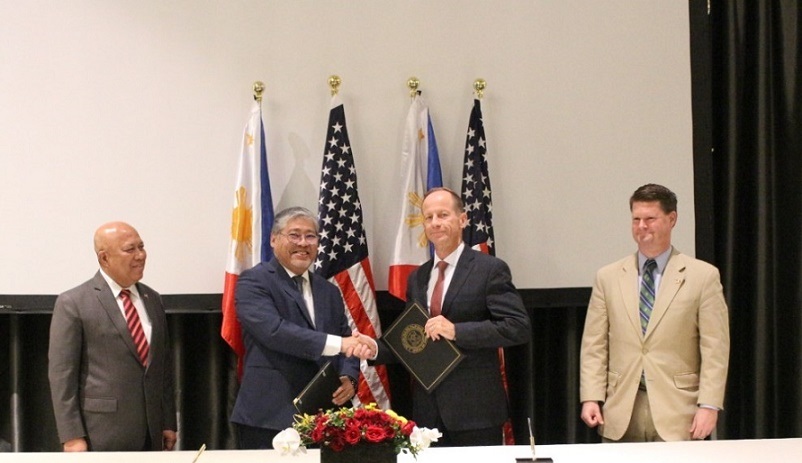
By Jose Maria Sison
NDFP Chief Political Consultant
The affirmation of the freedom of navigation of the US and all countries in the high seas of the South China Sea runs counter to the claim of China that it owns those high seas and that the artificial islands it has illegally built and militarized in the exclusive economic zone of the Philippines also generate Chinese territorial sea.
That the representatives of the Philippines and the US can make such affirmation has certain implications and consequences, like the following: Duterte cannot evade the UNCLOS and international law and the assertion of the freedom of navigation by the US and other countries and consequently China is going to demand from Duterte fulfillment of his promise to sell out Philippine sovereign rights in exchange for the commissions and other payoffs for himself and his ruling clique.
In the meantime, the competition of the US and China in using Duterte is heating up at the expense of the Filipino people. The US has gotten a joint affirmation with the Philippines in favor of its freedom of navigation. But despite US security warnings, Duterte has agreed to let China Telecom and Huawei control the Philippine communications system.
And of course China is still on track in trying to turn the Philippines into a debt colony through high interest loans and overpriced infrastructure projects and to get the trillions of dollars worth of gas and oil resources in the exclusive economic zone in the West Philippine Sea through a lopsided exploration and exploitation agreement.
Duterte is vulnerable to a withdrawal of support by a combination of patriotic and pro-US military officers because of the growing discontent of the Filipino people over Duterte’s crimes of treason, tyranny, mass murder and corruption. They are strongly offended by the treasonous sell-out of Philippine sovereign rights to China by Duterte.
As in the ouster of Marcos and Estrada, gigantic protest mass actions can encourage said military officers to withdraw support from Duterte before he can satisfy the US on his promises to destroy the revolutionary movement or allow by charter change foreign corporations to have 100 per cent ownership of Philippine land, natural resources and all types of businesses.
========================================================================
US, PH reaffirm freedom of navigation in SCS
Johnna Villaviray Giolagon
July 16, 2019
https://verafiles.org/articles/us-ph-reaffirm-freedom-navigation-scs?fbclid=IwAR3B1EuGg30chd8iueVkwf0k8dd0KVPMrYjPOpdZDjtAbwCg1xLpcPv4U4A

The United States will continue freedom of navigation patrols in the South China Sea despite protests by China, which enjoys close relations with the Duterte administration.
“Both sides reaffirmed their commitment to uphold freedom of navigation, overflight, and other lawful uses of the (South China Sea),” said a joint statement released after the two-day Philippines-US Strategic Dialogue in Manila.
The statement also “stressed the importance of peacefully resolving disputes in accordance with international law, as reflected in the Law of the Sea Convention” but did not directly reference to overlapping territorial and maritime claims in the SCS.
Conflicting SCS claims has been a major flashpoint these past years in the region following China’s assertion of dominance and the pushback from the US and other countries’ Navies.
The US has been leading freedom of navigation operations (FONOPs) in the SCS to assert the waters’ status as high seas and, therefore, does not belong to any one country.
The Philippines has not been part of these FONOPs.
Although the United States takes no position in the territorial dispute in the South China Sea among China, Philippines, Vietnam, Malaysia, Brunei and Taiwan, it does not recognize the change of status of the features in the Spratlys that were considered low tide elevation or LTEs- only above water at low tide – that were turned by China into artificial islands through reclamations as in the case of Mischief, Gaven and Subi Reefs.
Under United Nations Convention on the Law of Sea (UNCLOS), military vessels are only explicitly banned from conducting surveillance within another state’s 12 nautical mile territorial sea. China says that the US FONOPS infringe on their sovereignty claiming that 12 nautical miles from their artificial islands is part of their territorial sea.
The United States asserts that under UNCLOS, LTEs and artificial islands generate no territorial sea. Thus, there is no legal impediment for the U.S. Navy ships to operate within 12 nautical miles from Chinese-built artificial islands that were formerly LTEs.
Philippine Ambassador to Washington Manuel Romualdez told reporters after the dialogue that as the Philippines and the United States continue to strengthen its relations, “the United States will continue its FONOPs.”
The US has offered “no real assistance” In relation to the SCS dispute but is “supportive” of the Armed Forces’ modernization program.
“The only thing that we had in the discussion is that we will continue to just cooperate, we will continue the EDCA, strengthen that and make it work for our mutual benefit,” Romualdez said.
EDCA refers to the PH-US Enhanced Defense Cooperation Agreement signed in 2014 and meant to bolster the two countries’ alliance.
US Ambassador Sung Kim said the two panels had “a full discussion on all issues relevant to our alliance”.
He described the alliance as “robust” but did not expound except to say that “I think those discussions will continue.”
This meeting is the 8th annual Strategic Bilateral Dialogue between the Philippines and the US and is the principal forum for discussing political, security, and economic cooperation.
“The Philippines and the United States pledged to enhance their already robust defense cooperation, including by improving defense infrastructure, updating personnel and logistics procedures, and increasing mutual communication and coordination on operational elements of regional security,” said the joint statement released after the meeting.
Also tackled in the meeting were issue about economic cooperation and functional cooperation, which covers collaboration on how to address violent extremism.
Asked about progress in ongoing projects under the partnership, Romualdez said: “It’s an ongoing thing…it’s nothing new. This one may perhaps take a significant role because of the many issues surrounding the United States but it’s, again, all about strengthening, about continuing the dialogue.”